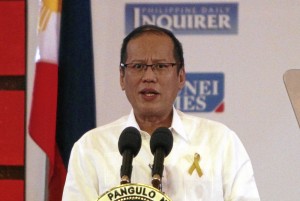
Reacting to Congress’ move to convene a bicameral constituent assembly to amend certain economic provisions of the Constitution, Mr. Aquino told reporters he had not changed his position against Cha-cha.
“I don’t agree that this is the solution to grow the economy,” he said.
The President spoke to reporters after he led the oath-taking rites of some of newly appointed officials, including Philippine National Police Director General Nicanor Bartolome.
Citing the case of China, Mr. Aquino said he believed that overall economic advantages rather than a country’s political system was the basis for deciding to invest in a country.
The President said he was aware of the new proposed mode to amend the Constitution through a bicameral constituent assembly because this had been raised to him by Senate President Juan Ponce Enrile but only in one instance and “in passing.”
“And we are in a democratic country. At least all of these ideas should be explored,” Mr. Aquino said. “But if I’m asked for my personal opinion, I don’t think Cha-cha is a necessary move at this point in time.”
Agreed in principle
Last week, Senate and House leaders agreed in principle to adopt the bicameral constituent assembly as the mode to amend economic provisions in the Constitution. The proposal was pushed by one of Mr. Aquino’s own party mates, Senator Franklin Drilon of the Liberal Party.
Asked to react to the President’s remarks, Enrile had this to say: “It’s up to Congress, not the President, to amend the Constitution.”
“The authority is given to Congress. Even if the President wants to amend the Constitution, if Congress will not act, he cannot do it. But if Congress will (insist on the move), the President cannot do anything. He cannot veto…I think he better study it carefully,” Enrile said Monday in an ambush interview at the session hall.
Enrile also dismissed statements that Albay Representative Edcel Lagman made earlier Monday about whether the Senate and the House of Representatives would vote separately when convened as bicameral constituent assembly.
“I don’t know how much reading he did of the Constitution…I have the 1935 Constitution with me and the ’73 Constitution and the ’87 Constitution. When I opened my mouth, I’ve read those provisions. Where does the 1987 Constitution say that Congress will meet jointly? And that we have to vote jointly,” Enrile said.
Some business quarters are lobbying Congress to amend provisions in the Constitution that limit foreign participation in public utilities and the extraction of natural resources.